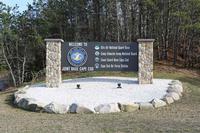As service members struggle with both housing availability and child care access, a bipartisan pair of lawmakers thinks they have a solution: Why not put them in the same building?
A bill being introduced Friday by Reps. Sara Jacobs, D-Calif., and Jen Kiggans, R-Va., would make the military services study the possibility of building apartment-style military housing that also includes child care centers.
"Having a safe and affordable place to live and raise your kids is a critical component of our national security, because without it, our service members can't focus on their mission," Jacobs said in a statement to Military.com ahead of the bill's release. "We need to continue thinking outside the box and pursue innovative solutions to improve the quality of life of our service members and military families."
Read Next: Army Eliminates Online Training Requirement for Noncommissioned Officers, Saying It's Too Burdensome
Jacobs and Kiggans' idea already has some momentum. A similar feasibility study on constructing apartment-style, multi-unit housing with space dedicated to child development centers was included in the House Armed Services Committee's draft National Defense Authorization Act, or NDAA, that was released at the beginning of this week and will be debated by the committee next week.
Jacobs and Kiggans are introducing a stand-alone bill even though a study is already included in the must-pass NDAA in order to emphasize the importance of the issue, a spokesperson for Jacobs told Military.com.
Housing availability and affordability has been an issue in recent years for service members stationed in high-demand, high-cost areas such as Jacobs' San Diego-area district and Kiggans' Virginia Beach-area district.
"Many service members are sleeping in their cars or on friends' couches because they can't find housing," Jacobs said in her statement. "And if they're lucky enough to find it, the housing options can have serious deficiencies that threaten the health and safety of families, especially young children."
Congress and the Pentagon have sought to relieve the affordability concerns through increases to the Basic Allowance for Housing, or BAH, and updating the formula for the allowance to better match actual housing costs. This year, the House's draft NDAA would also make the BAH cover 100% of housing costs instead of the current rate of 95%.
Meanwhile, staffing shortages and limited facilities have contributed to wait-lists for on-base child care that can be as long as seven months, making military child care an untenable option for many military families. But at the same time, service members are also often unable to afford the cost of civilian child care.
Proposals to put child care and housing in the same building have gained some traction in the civilian world among affordable housing advocates.
A 2022 report from a nonprofit called the Low Income Investment Fund touted using one development for both needs as "an opportunity to respond to severe housing and child care shortages simultaneously," and a bill introduced last year by a pair of Democrats would create a grant program to fund construction of child care centers in affordable housing buildings.
The study that would be ordered by Jacobs and Kiggans' bill would have to look at the feasibility of developing multi-unit housing that includes space for child care centers in areas with the highest BAH rates. The apartment complexes would be part of the military's privatized housing program. The military services would have 120 days to conduct the study.
"As a former Navy helicopter pilot, Navy spouse, and now a Navy mom, I know how important it is for our military families to have access to consistent child care," Kiggans said in a statement.
In calling for a similar study, the draft NDAA notes that "service members have indicated that integrating essential services such as child care within residential complexes is a growing need."
The study in the NDAA would be due in March 2025 and would have to look at cost implications of building and maintaining large privatized apartment complexes with the potential for space to be dedicated to child care, locations within high-cost metropolitan areas where the housing could be most beneficial, and any regulatory or financial barriers.
"Long commutes and scarcity of available child care options complicate the living situations of military families," the NDAA says, "highlighting an area for improvement in their quality of life."
Related: Better Access to Child Care for Military Families Is Aim of New Senate Proposal














